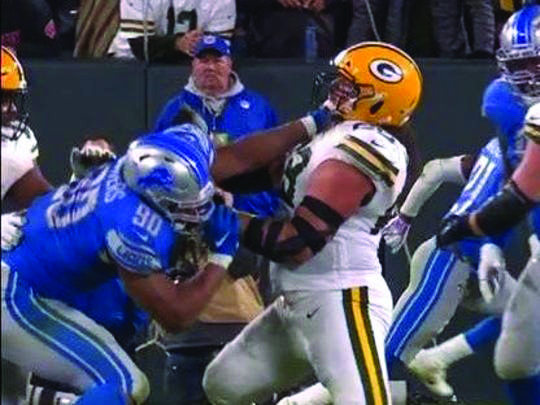Penalties for the sake of penalties

Trey Flowers gets called for a phantom penalty Photo by: NFL Game Pass
October 22, 2019
The National Football League is no stranger to officiating issues, though it seems to have recently evolved into somewhat of a plague. In an attempt to fix a flawed officiating system, the NFL has essentially offered a bandage in an area where a complete policy overhaul is required. The NFL has taken steps to concurrently make football safer and uphold the integrity of the sport. They have implemented an enhanced roughing the passer penalty that aims to protect quarterbacks from falling victim to the types of hits which often result in severe injury. They have also made pass interference calls challengeable by head coaches. It seems that more and more penalties are being called, obstructing the flow of the game. The influx of superficial violations or phantom penalties have resulted in a number of outright bad calls, some of which have ultimately decided the fate of games.
A recent example occurred this past Monday night during the divisional showdown between the Detroit Lions and the Green Bay Packers. The first of two controversial penalties was against Trey Flowers, a defensive end for the Lions. Flowers was called for an illegal hands to the face penalty that negated a third down sack for the Lions, providing Green Bay with a first down rather than what should have been a fourth down. Announcer Booger McFarland was outspoken about his disagreement with the call as the replay was played. Flowers’s hand was visibly placed on Packers’ offensive lineman David Bakhtiari’s shoulder pad, which is allowed under NFL guidelines. Later in the game, Flowers was called for another illegal hands to the face penalty, this time providing the Packers an additional set of downs, ultimately allowing the Packers to run out the clock and convert the game winning field goal. McFarland weighed in on his frustrations to viewers by saying: “Let’s make sure we let America know that. That’s twice. The first time it cost (the Lions) a sack. This time it cost them the game.”
In Week Two, the Chicago Bears defeated the Denver Broncos 16-14. The Bears won in the final seconds with a 53-yard field goal that was set up in part by bad officiating. With under a minute to play, Broncos’ linebacker Bradley Chubb was hit with a controversial roughing the passer penalty, affording the Bears 15 unearned yards and helping set up the game-winning field goal. Ultimately the league office commented that it was a judgment call by the referee and that the league stands behind it. Although it is somewhat subjective, the video seems to show that Chubb was not trying to place his body weight on Bears’ quarterback Mitchell Trubisky, a qualifier for whether or not a roughing the passer penalty is warranted. Chubb seemed to be making contact just as Trubisky released of the ball. It appeared to be a fairly routine football tackle.
The increase in roughing the passer calls seems to have players, fans and analysts confused as to what constitutes a penalty. The safety of players is undoubtedly important. However, many of the calls made by officials have been inconsistently applied and poorly judged. There seems to be too many instances where players noticeably try to either ease up on the quarterback or avoid contact as best as possible once the ball is out of the quarterback’s hands. This penalty seems increasingly subjective and inconsistently called. What fun is football if defensive players can’t sack the quarterback or players can’t engage in physicality on the field?
At what point do we stop micromanaging football for the sake of prioritizing safety and let the players play the game? Football is a contact sport, subsequently meaning that players voluntarily place themselves in precarious situations that may result in injury. Safety is important and an issue that deserves scrutiny, but this new wave of officiating seems to be detracting from the game. Players continue to get injured every week, which begs the question of whether overbearing officiating is actually a viable solution to a persistent problem or just a well-crafted public relations tactic.





